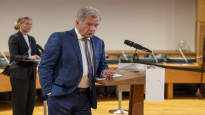Finland’s image of Russia is gloomy, and politicians let it be heard in their speeches, writes NATO special reporter Maria Stenroos.
Maria Stenroos NATO special reporter
At the Ambassadors’ Day, we heard how the Finnish leadership is now talking about Russia.
The tone of the Russia speeches was assertive or cold, sometimes sharp. The change to the language of the time before the war of aggression in Russia is revolutionary.
On Monday, the foreign minister Elina Valtonen (collective) said: “The liberal world order has its crisis. But not the kind of crisis that would make us poison political opponents, attack a sovereign country, bomb airliners, stage elections, and threaten our own citizens with violence.”
On Tuesday, the president Sauli Niinistö stated: “Month after month, Russia has escalated its military operations. It has bombed civilian infrastructure and cities, annexed new territories and used cold and hunger as its weapons. By withdrawing from the Black Sea Grain Agreement, Russia has more and more clearly taken hostage the global food market and the countless people who are most severely affected by the rise in grain prices”
Valtonen also stated that Finland no longer has its own bilateral political relationship with Russia. Niinistö, on the other hand, colorfully described Russia’s information warfare.
At the ambassador days, the heads of Finnish embassies abroad get an overview of what is going on in Finland. The ministers and the president give speeches that are public, but the discussions take place behind closed doors.
The situation in foreign policy is good. The war in Ukraine continues, and Finland’s relations with Russia are bad. The war has not spread elsewhere, but there is no clear way out of the situation.
The West, China, Russia and other significant power users of the world are seeking positions.
NATO membership seems to have dispelled Finland’s security threats. The defense cooperation agreement (DCA) being negotiated with the United States is the next element with which Finland secures its background. However, there is not much new to tell or discuss publicly about NATO participation or defense cooperation, because the preparation is in progress.
Prime minister Petteri Orpon (collective) time has so far been spent investigating the government’s crises. At the ambassadors’ meeting, the government did not have a vision of what else Finland would do other than maintain good relations across the Atlantic and with NATO partners and defend free trade.
President of the Republic Sauli Niinistö is in his last year on the job. He tries to see ahead in a situation where it is almost impossible.
“The discussion about the future of the European security order is also starting. Good. But as long as war rages in Europe, sketching a new security arrangement is groping in the dark. Still, there is something to be groped for,” Niinistö said.
Niinistö sees a glimmer of light in the fact that peace has been mentioned for a long time when talking about the war in Ukraine. The “contours” of peace emerged at a meeting held in Saudi Arabia at the beginning of August, in which China also participated. Russia was not there.
Another small glimmer of light from Niinistö’s speech is that when the community of developing countries BRICS (Brazil, India, China and South Africa and Russia) is currently meeting, the Russian president Vladimir Putin participating remotely. Putin was probably held in Russia by an international war crimes court arrest warrant.
The European security order is also messed up, but Niinistö hopes that it can be discussed in 2025, when Finland leads the speech in the European Security Organization.
In case of Russia’s hybrid warfare, Niinistö advised the Finns to try to understand each other “before we get confused”.
“It feels like history is being fast-forwarded. So much has happened since the last ambassadorial meeting. In the world and here in Finland”, Niinistö stated.
The single biggest thing is joining NATO in April. It will also go down in history as a major turning point in Niinistö’s season.
On the other hand, in the speeches of the president and ministers, the same things seem to be repeated in Finnish foreign policy as before: The Nordic countries are close, defense cooperation works, the OSCE meeting is awaited and there is still a long common border with Russia.
Niinistö has made a habit of reminding what he has already said before. In his speech, he repeated many of his long-term concerns: The Preparedness Act is still not ready. Europe does not bear enough responsibility for its own defense. Finland should not be too accepting in its immigration policy.
President Niinistö’s term ends next spring. For now, it is pointless to seek to leave a legacy or cool down the president’s speeches or actions.
